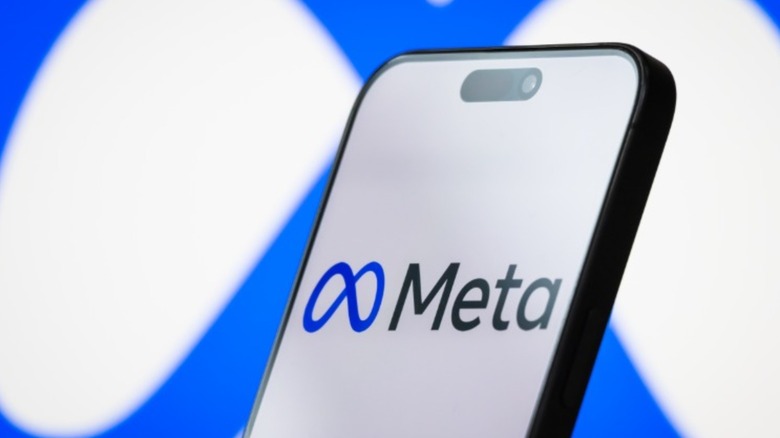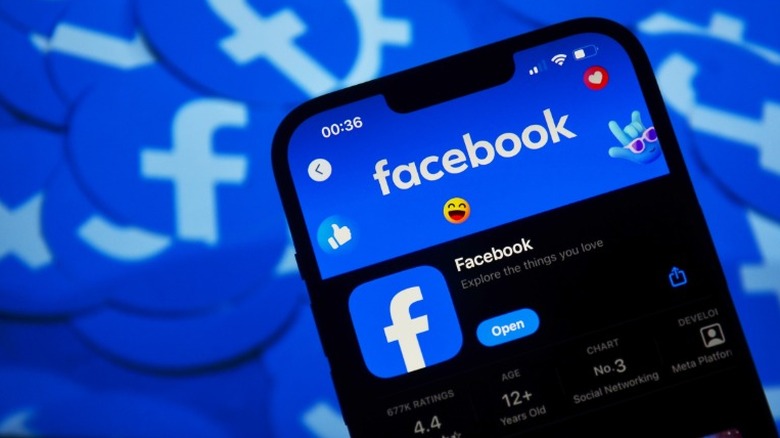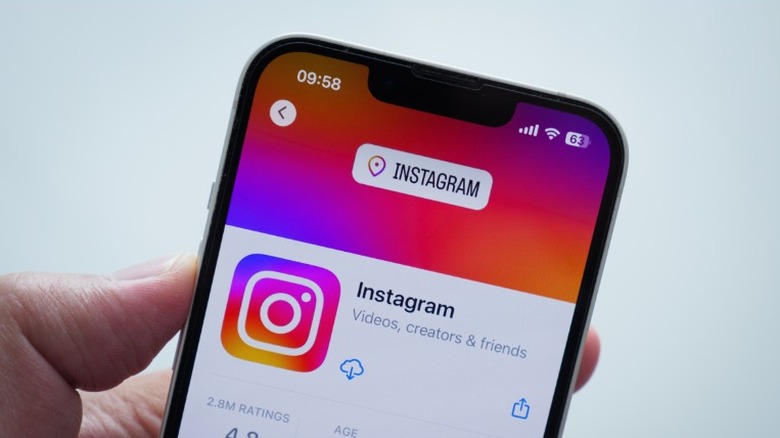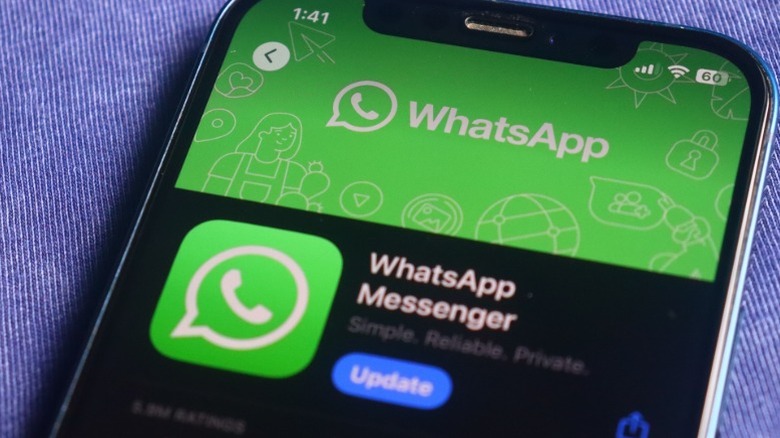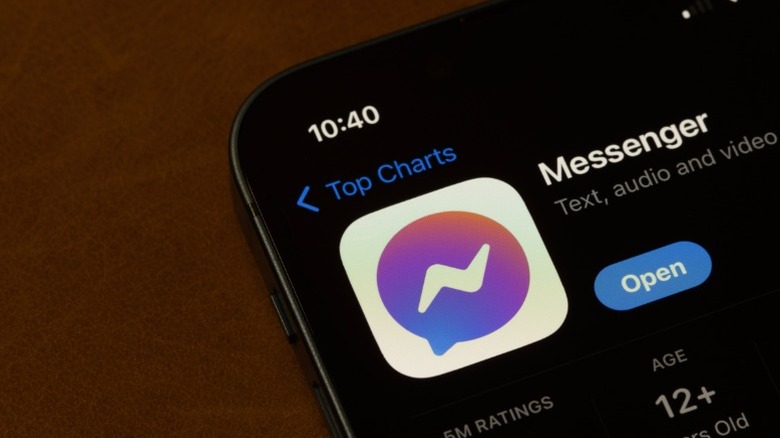5 Of The Biggest Companies Owned By Meta
When a company has an extremely successful product, it eventually becomes the face of the brand. For Meta, that product was Facebook. "The Big Blue F" has become a symbol of youthful innovation and the early Silicon Valley boom. But while Facebook remains its most popular product, Meta has grown far beyond it. Over the years, it has acquired competing social media platforms and launched ambitious projects in virtual reality, augmented reality, and even artificial intelligence research and development initiatives.
Today, the multi-industry tech giant serves nearly 3.43 billion daily active users and is currently valued at over $1.5 trillion, making it one of the world's most valuable companies. In 2024 alone, the company generated about $164.5 billion, most of which came from ad revenue and the rest from hardware and software investments. With that in mind, here are five of the most prominent and biggest companies owned by Meta.
Meta's origins trace back to 2004 with the launch of its social networking application, Facebook. What started as a student directory put together by Mark Zuckerberg and a couple of classmates at Harvard soon became one of the most dominant platforms on the internet. Two decades later, Facebook rebranded as Meta, but the social media platform remains the company's largest and most important product. Alone, it contributes more than half of Meta's annual revenue, most of which comes from digital advertising.
Even with social media taking on different forms over the years and with primary messaging making way for video, Facebook has remained relevant for building community, news, and entertainment. Incorporating newer features like Facebook Marketplace, Reels, and Public groups has contributed to the platform's ability to compete with newer, shinier applications like TikTok and Instagram. Beyond entertainment and personal use, Facebook has become a hub for generating public engagement. From political campaigns to brand building and marketing for small businesses, Facebook is one of the most influential platforms in the social and digital media space.
Instagram wasn't always the algorithm-driven platform we know today. When it first launched in 2010, it was a simple photo-sharing app designed so mobile users could share photos from their day-to-day lives with their friends, sometimes with the occasional retro filter. When Meta acquired Instagram in 2012, the company had just 13 employees but a rapidly growing user base.
As part of the Meta structure, Instagram expanded its use case beyond just static pictures, introducing features such as video posts, Instagram Stories, Reels, and an Explore tab. With the launch of the shopping platform, Instagram became the perfect environment for creators to build and monetize their audience.
Now, Instagram has over 2 billion monthly active users and is one of the most culturally influential platforms among many young people today. The Instagram Reels feature, in particular, lets it compete with TikTok, keeping users engaged with short-form video content. Instagram's robust suite of features moved the app from a simple day-to-day social media application to a monetization platform.
When Meta first acquired WhatsApp in 2014 for a whopping $19 billion, people in the industry wondered whether it was a good idea. On the face of it, WhatsApp was a simple messaging app with no stickers, no business tools, but most importantly, it was ad-free. But what it lacked in features back then, it made up for in global reach, with over 450 million active users.
Today, WhatsApp is the most-used messaging application in the world, with over 3 billion monthly active users. Users in Brazil, India, and the United States rely on it for everything from daily chats to business transactions. Despite becoming part of the Meta structure, WhatsApp still has its simple messaging focus and privacy appeal.
After the acquisition, Meta added its flair to the app by introducing features like voice and video calls, disappearing messages, and group communities. For a while, Meta adapted to WhatsApp's ad-free business model. But recent updates have introduced ad placements to WhatsApp within the updates tab. With changes like this, WhatsApp may finally be able to contribute more to Meta's revenue strategy.
Messenger
What started as a simple chat feature within Facebook has since become a highly successful standalone product. Messenger, formerly known as Facebook Chat, was taken out of Facebook to stand alone in 2011 as a way to focus on and streamline communication across various digital platforms and devices.
Today, Messenger has over 947 million active users worldwide. The app offers a wide range of communication features, like voice and video calls, group chats, stickers, file sharing, and end-to-end encryption support. Messenger also serves business owners as a platform to connect with customers directly through chats, send updates, and even handle customer support with automated support bots.
The most attractive feature of Messenger, however, is its flexibility in integrating with Meta's suite of social networking apps. For example, a Facebook profile automatically means you have a Messenger profile, but you can choose to operate Messenger even without an active Facebook profile.
Oculus
With the acquisition of Oculus VR for $2 billion, Meta went in a separate direction in terms of industry focus. When the acquisition happened, Oculus had just completed a crowdfunding campaign for early virtual reality headset prototypes. The company was unlike any other Meta acquisition. It wasn't a messaging app or a social media network; it was hardware.
By acquiring Oculus, Meta showed that its ambition went beyond digital media to include immersive gaming and entertainment experiences. After the acquisition, the company rebranded as Meta Quest to support Meta's goal of building new ways to connect and share experiences via the metaverse. The product line under the Meta Quest headline includes Quest 2, Quest 3, and the high-end Quest Pro, all stand-alone VR headsets designed for gaming, fitness, productivity, and social interaction.
While Oculus may seem out of place in line with Meta's social networking apps, it's a big deal in the consumer VR market and brought in $2.1 billion in revenue through the Reality Labs division in 2024. From VR headsets for gaming to partnerships like the luxury-priced Meta Xbox VR headsets, Meta platforms have shown their commitment to investing in virtual reality as the future of gaming.
